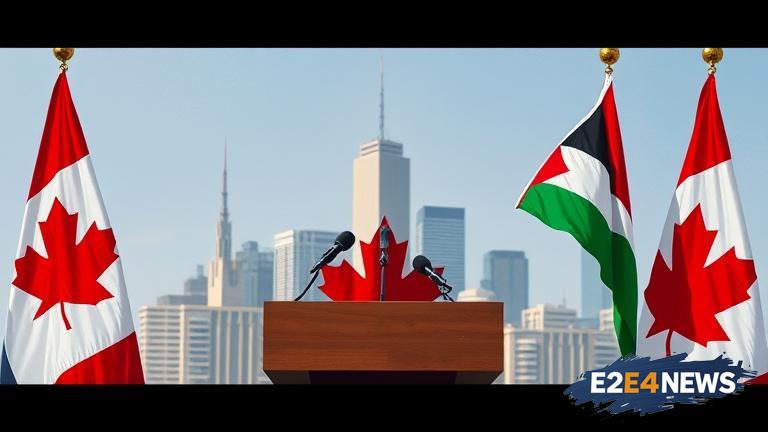Canada’s decision to recognize Palestine as a state is a major development in the country’s foreign policy, particularly with regards to the Israeli-Palestinian conflict. This move is expected to have far-reaching implications for the region and the global community. The Canadian government has stated that its decision is driven by a desire to promote peace and stability in the Middle East. By recognizing Palestine as a state, Canada is acknowledging the Palestinian people’s right to self-determination and their desire for statehood. This decision is also seen as a way to counterbalance the influence of other countries in the region. The Canadian government has emphasized that its decision is not intended to undermine the peace process or the two-state solution. Instead, it is hoped that recognition of Palestine as a state will help to create a more level playing field for negotiations between Israelis and Palestinians. The decision has been welcomed by Palestinian leaders, who see it as a major victory in their quest for international recognition. However, the move has been met with criticism from Israel, which has long opposed the idea of Palestinian statehood. The Israeli government has argued that recognition of Palestine as a state would be premature and could undermine the peace process. Despite this, Canada’s decision is seen as a significant step forward for the Palestinian people, who have been seeking statehood for decades. The move is also expected to have implications for Canada’s relationships with other countries in the region, including Israel and the United States. The Canadian government has stated that it will continue to work with its international partners to promote peace and stability in the Middle East. In addition to recognizing Palestine as a state, Canada has also announced plans to increase its aid to the Palestinian territories. This move is seen as a way to support the Palestinian people and help to promote economic development in the region. The decision to recognize Palestine as a state has been praised by human rights groups and other organizations that have been advocating for Palestinian statehood. These groups see the move as a major step forward for the Palestinian people and a significant development in the quest for peace and justice in the Middle East. However, the decision has also been criticized by some who argue that it could undermine the peace process and create tensions in the region. Despite these concerns, the Canadian government remains committed to its decision and is working to implement it in a way that promotes peace and stability. The recognition of Palestine as a state is a complex issue that involves a range of political, economic, and social factors. It is hoped that Canada’s decision will help to create a more positive and constructive dialogue between Israelis and Palestinians, and will ultimately contribute to a lasting peace in the region. The move is also seen as a way to promote Canadian values such as justice, equality, and human rights. By recognizing Palestine as a state, Canada is demonstrating its commitment to these values and its desire to promote peace and stability in the Middle East. In conclusion, Canada’s decision to recognize Palestine as a state is a significant development in the country’s foreign policy and a major step forward for the Palestinian people. The move is expected to have far-reaching implications for the region and the global community, and is seen as a way to promote peace, stability, and human rights in the Middle East.
